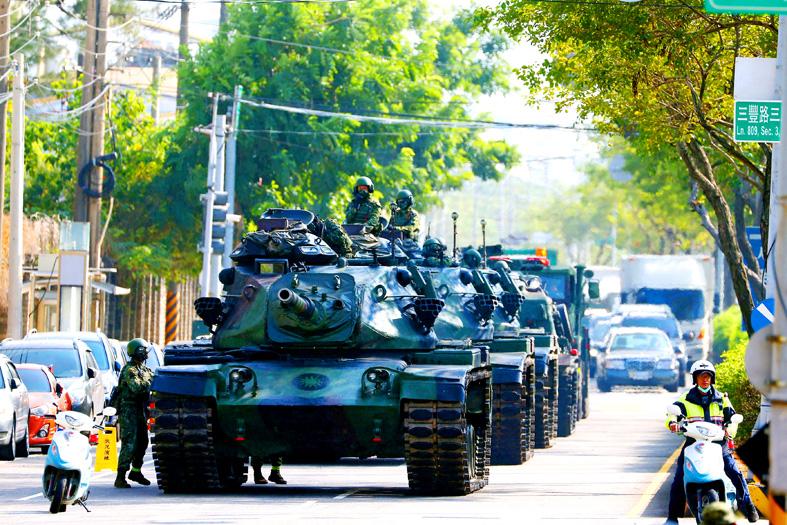A bill introduced in the US Senate on Friday would make US policy on arms sales to Taiwan more consistent, a Taiwanese defense expert said on Saturday.
The bill, dubbed the Taiwan Weapons Exports Act, would “fast-track weapons to Taiwan” by expediting congressional approval and eliminating administrative roadblocks amid increasing tensions between Taiwan and China, US Senator Josh Hawley, who proposed the bill, said in a statement.
In particular, the bill seeks to redesignate Taiwan from Country Group A:5 to Country Group A:6 so that it can receive a strategic trade authorization license exception under the Export Administration Regulations, the statement said.

Photo: Ann Wang, Reuters
Other countries in Country Group A:5 include NATO member states Australia, India, Japan and South Korea, the statement said.
Su Tzu-yun (蘇紫雲), an analyst at the government-funded Institute for National Defense and Security Research, said that the proposed legislation would make the US’ policy of arms sales to Taiwan more consistent.
US arms sales to Taiwan are currently reviewed by the US Department of State on a case-by-case basis and the time spent on each sale can differ greatly, he said.
The bill, if passed and signed into law, would bring the review process in line with that for NATO members and other US allies, Su said, adding that it would also prevent disruptions in sales of defense products to Taiwan due to political factors.
Meanwhile, Chieh Chung (揭仲), an associate research fellow at the National Policy Foundation in Taipei, said that the bill would also shorten the congressional review of US arms sales to Taiwan from 30 days to 15 days.
Arms sales to major US allies, such as NATO members, Israel, Japan and South Korea, require approval from the US Congress if a single deal is estimated to cost more than US$25 million, Chieh said, adding that congressional review takes about 15 days.
Any US arms sales to Taiwan worth more than US$14 million currently require congressional approval, with the review process taking up to 30 days, he said.
When it comes to the sale of major defense articles and strategic technologies, the US government tends to prioritize major allies, Chieh said.
The proposed legislation would pave the way for Taiwan to acquire advanced weapons and technologies like other major US allies, he added.
The Ministry of Foreign Affairs on Saturday thanked Hawley for his consistent support of Taiwan, saying in a statement that it would closely follow the proposed bill’s progress.
Taiwan would continue working with the US Congress and US President Joe Biden’s administration to further improve bilateral ties and contribute to stability in the Indo-Pacific region, it added.

Palauan President Surangel Whipps Jr arrived in Taiwan last night to kick off his first visit to the country since beginning his second term earlier this year. After arriving at Taoyuan International Airport at around 6:30 pm, Whipps and his delegation were welcomed by Minister of Foreign Affairs Lin Chia-lung (林佳龍). Speaking to gathered media, the Palauan leader said he was excited and honored to be back in Taiwan on his first state visit to Taiwan since he was sworn in this January. Among those traveling with Whipps is Minister of State Gustav N. Aitaro, Public Infrastructure

President William Lai (賴清德) yesterday thanked Palau for its continued support of Taiwan's international participation, as Taipei was once again excluded from the World Health Assembly (WHA) currently taking place in Switzerland. "Palau has never stopped voicing support for Taiwan" in the UN General Assembly, the WHO and other UN-affiliated agencies, Lai said during a bilateral meeting with visiting Palau President Surangel Whipps Jr. "We have been profoundly touched by these endorsements," Lai said, praising the Pacific island nation's firm support as "courageous." Lai's remarks came as Taiwan was excluded for the ninth consecutive year from the WHA, which is being held in

RESOLUTIONS DEBATE: Taiwan’s allies said that UN and WHA resolutions cited by China and other nations ‘do not determine Taiwan’s participation in WHO activities’ A proposal to invite Taiwan to this year’s World Health Assembly (WHA) was rejected on Monday, resulting in Taipei’s absence from the annual meeting for a ninth consecutive year, although partners spoke up for Taiwan’s participation at the first day of the meeting. The first agenda item after the opening was a “two-on-two debate” on a proposal to invite Taiwan to participate at the WHA as an observer. Similar to previous years, two countries made statements in favor of the proposal, while two others expressed their opposition. Philippine Secretary of Health Teodoro Herbosa, president of the 78th WHA, accepted the WHA General Committee’s

At least three people died and more than a dozen were injured yesterday afternoon when a vehicle struck a group of pedestrians in New Taipei City’s Sansia District (三峽). The incident happened at about 4pm when a car rammed into pedestrians at an intersection near Bei Da Elementary School. Witnesses said the sedan, being driven at a high speed, ran a red light, knocking scooters out of the way and hitting students crossing the road before careening into a median near the intersection of Guocheng and Guoguang streets. The incident resulted in three deaths and 13 injuries, including the driver, a 78-year-old man